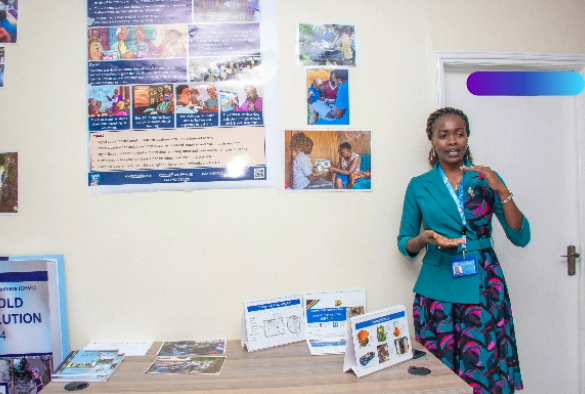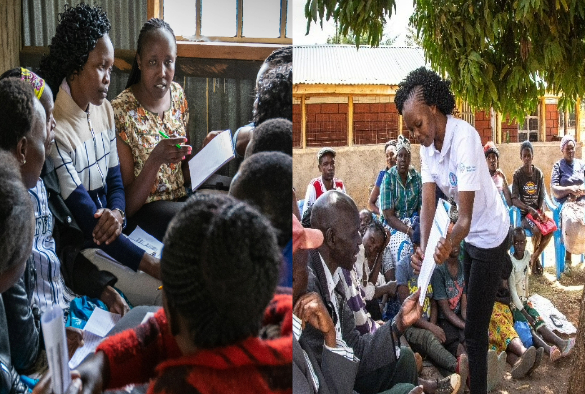
Nancy Chebichii is a Kenyan researcher for the NIHR Global Health Research Unit – CLEAN-Air(Africa). The unit is co-Directed by the University of Liverpool and the Kenya Medical Research Institute (Centre for Respiratory Disease Research) in Nairobi where she is based. CLEAN-Air(Africa) is carrying out ground-breaking research and health systems strengthening in sub-Saharan Africa to address the burden of disease from Household Air Pollution.
Household air pollution (HAP) is a significant global health concern, particularly in low and middle-income countries as most of the population cook using polluting solid fuels such as wood, crop waste, charcoal, coal and dung; and kerosene in open fires and inefficient stoves. Exposure to HAP from polluting cooking fuels has been linked to various health issues, such as respiratory diseases, cardiovascular problems, and adverse pregnancy outcomes. While health education programs have shown potential in raising awareness and promoting behaviour change, there is inadequate awareness on HAP and thus the population lack a significant strategy to address issues of HAP. The common barrier to create awareness has been lack of capacity and resources to create change.
In the wake of technological advancements, the digitalization of training has emerged as a powerful game- changer for community health and health system, enhancing availability of health information and community awareness. The innovative approach has enabled the equitable dissemination of crucial evidence-based health information to remote areas, empowering communities to take charge of their well-being.
From Novice to Advocate: A Journey in Public Health
Growing up surrounded by the beauty of nature and the challenges of community health issues, I have always been passionate about public health. Driven by a deep desire to improve lives, I developed a profound interest in understanding the root causes of diseases and finding solutions to improve public health, this led me to pursue studies in Public Health, and eventually became a Public Health Officer after which I pursued Epidemiology and Biostatistics.

It was during one of my routine workshops for Community Health Workers (CHWs) that my life took a transformative turn; I encountered the team from CLEAN-Air(Africa), conducting community based training on prevention of HAP through clean household energy and harm minimization. I was already aware of the problems of cooking smoke on health as experienced by women and children in the community and I was impressed by the team’s dedication, the training materials, approach to education and community engagement employed by CLEAN-Air(Africa). The research leads discussed the wider program with me and I joined them in piloting a training programme. This marked the beginning of my journey of becoming an integral member of the CLEAN-Air(Africa) Unit as research lead at KEMRI recruited by its co-Director Dr. James Mwitari. I have since become the health systems strengthening lead for the Unit delivering community health worker training across Kenya to combat HAP disease through promotion of transition to clean energy use.
As a seasoned trainer, I understand what it takes to empower community health workers and their assigned households to make positive changes for their health. My input has helped deliver behaviour changing training sessions for CHWs, empowering them with knowledge and skills to deal with health challenges arising from HAP and fostering a culture of prevention. I am now leading the national rollout of Module 14 Community Household Air Pollution Prevention Program (CHAP-PP) spearheaded by the Office of the First Lady of the Republic of Kenya as part of the ambitious attainment of Universal Health Care through the Community Health Strategy, with the aim of reaching every Kenyan community households.
Digitalizing Training for Community Health
The availability of accurate health information and community awareness is essential for promoting preventive health practices, early disease detection, and effective health protection. However, disparities in access to health information persist, particularly in underserved communities. Thus, there is a need to explore strategies that can ensure equal availability of health information and assist communities in protecting their health based on evidence conveyed in simple and culturally appropriate ways to bridge the information gap and promote health equity.
CLEAN-Air(Africa)’s vision of a healthier, cleaner, and more sustainable future resonate with people, driving them to take action and join the movement for a better sustainable world. But to reach every household across Kenya’s 47 counties it is necessary to deliver training to 130,000 CHWs – costly and impractical for the Ministry of Health but identified as a key priority. Therefore I have been working on behalf of CLEAN-Air(Africa) with a digital partner to convert all HAP prevention training materials to a digital method of delivery. To this end I have become the face of CLEAN-Air(Africa)’s Community Household Air Pollution Prevention Program (CHAP-PP) being the official narrator for delivery of the course after months of filming and careful interrogation of the course. I have also narrated a new documentary for CLEAN-Air(Africa) on the hidden killer of carbon monoxide poisoning from use of charcoal fuel in Kenya.
Having successfully completed my MSc in Epidemiology and Biostatistics, my educational journey continues with my PhD under the CLEAN-Air(Africa) programme. My studies delve deeper into the potential of CHWs in community messaging and prevention of HAP associated diseases and promoting clean cooking energy strategies, as well as the potential of digitalizing training to scale up its reach and effectiveness. I envision using technology to bridge equity gaps to ensure health information is available to even the most remote communities.